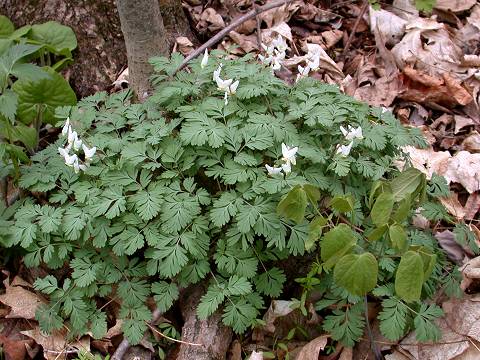

Dicentra cucullara - (image 1 of 9)
Taxonomy
Family: Fumariaceae
Habitat
Rich, mesic woods.
Associates
Acer saccharum, Celtis occidentalis, Fraxinus americana, Prunus virginiana, Quercus rubra, Sambucus canadensis, Tilia americana, Ulmus rubra. Allium tricoccum, Cardamine douglassii, Caulophyllum thalictroides, Claytonia virginica, Dentaria laciniata, Erythronium albidum, Hydrophyllum virginianum, Osmorhiza claytonii, Sanguinaria canadensis, Solidago flexicaulis.
Distribution
Nova Scotia and eastern Quebec, west to northern MN, south to GA, AR, and KS; disjunct populations occur in WA, OR, and ID.
Morphology
Low, mounding perennial, from short rhizomes covered by small, white or pink, tear-shaped bulblets. Leaves all basal, finely divided. Flowers in an arching scape, irregular; corolla with divaricately spreading spurs, the spurs longer than broad (more "pointy" than those of D. canadensis).
Notes
Flowers late March to mid May
Wetland indicator: Upland
Can't say I have ever seen a Dutchman's breeches but apparently these flowers look like them.
References
Gleason, Henry A.
and A. Cronquist. 1991. Manual of Vascular Plants of Northeastern United States
and Adjacent Canada. Second Ed.
The New York Botanical Garden. Bronx, NY
Swink, F. and G. Wilhelm. 1994. Plants of the Chicago Region.
Indiana Academy of Science. The Morton Arboretum. Lisle, Illinois.
|
Michael Hough © 2004 |